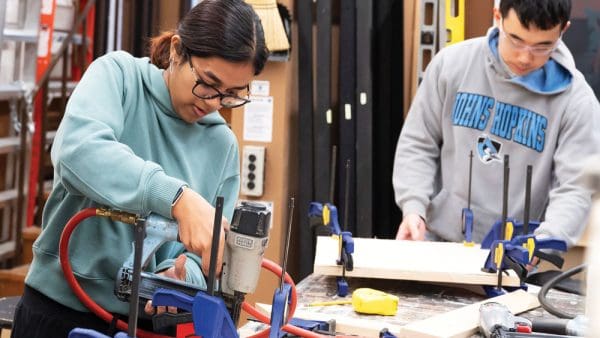“I believe the name ‘Hop-Frog’ was not given to the dwarf by his sponsors at baptism,” Edgar Allan Poe begins.
The protagonist and title character of Poe’s 1850 short story was given his name by a cruel king and his court. Their jester Hop-Frog was the butt of every joke, teased relentlessly about his body, forced to drink wine and wear ridiculous costumes. But then, on what seemed like any other evening of royal excess, Hop-Frog fooled the king and his ministers with his clever wit and—long story short—burned them all alive. “This is my last jest,” he declares, seconds before “his fiery revenge” on the king.

Illustration by John S. Dykes
Classic Poe, one might say… as improbable as it is macabre. But to the well-trained student of literature, one might add: classic 19th-century American.
“I’ve always been fascinated with confidence games and con men,” says Doug Tye, a graduate student in the Department of English and the instructor of the course Social Climbers and Charlatans in American Literature. Tye’s father, a motivational speaker from the Midwest, sparked his son’s curiosity at an early age. “I’m interested in the practice of selling ideas that ‘make you better’… selling a product that doesn’t really exist,” he says. “That’s all tied up in this rags to riches American ideal that leads people to think they can be self-made, from nothing to something.”
That’s also the impetus for Tye’s course: connecting great authors of 19th- to early 20th-century American literature through common themes of rapid social mobility and dubious self-representation. Franklin, Emerson, Thoreau, Poe, Barnum, Twain, and Fitzgerald were all too aware of “the tensions between individual achievement and democratic egalitarianism,” Tye explains. Authors of this period routinely cast their protagonists as self-made, often to a nearly impossible extreme—like the social mobility of Twain’s African-American characters or the rise and fall of Jay Gatsby.
“The biggest thing I want is for students to read a small collection of classic American works,” says Tye. “But they should also see these themes of self-making and self-fashioning, and think about the ways that the character’s cons can be seen as artifice and the ways they can be seen as genuine invention.”
Tye is one of 27 Dean’s Teaching Fellows for the fall semester. They were selected in a competitive grant process within the Krieger School, whereby doctoral students are chosen to teach a course of their design during their most advanced years of study at Johns Hopkins. These soon-to-be professors are given the opportunity to lead small seminars on the very subject that interests them the most, while undergraduates have the pleasure of working closely with a scholar. “This is the fellowship every advanced grad student wants to get,” says Tye, who taught four semesters of Expository Writing and submitted an extensive curriculum and lesson plan in order to garner this fellowship.
“Tye has a very interesting take on the subject matter he covers in class,” says Adam Dec ’15, who took one of Tye’s courses in his freshman year and is currently enrolled in Social Climbers and Charlatans in American Literature. “He takes apart every single detail, analyzes the material so well, and really tries to get everyone involved.”
Surely the irony is not lost on Tye: Like his 19th-century protagonists, he’s also in the business of selling intangible ideas and explanations to his students. “Not all confidence games are crimes,” he’s quick to add. “Sometimes it’s just two people who agree on something and they both get what they want.”
Tye’s class, which is one of eight Dean’s Teaching Fellowship courses that have been waitlisted this semester because of student demand, seems to be precisely what Hopkins undergraduates want.




